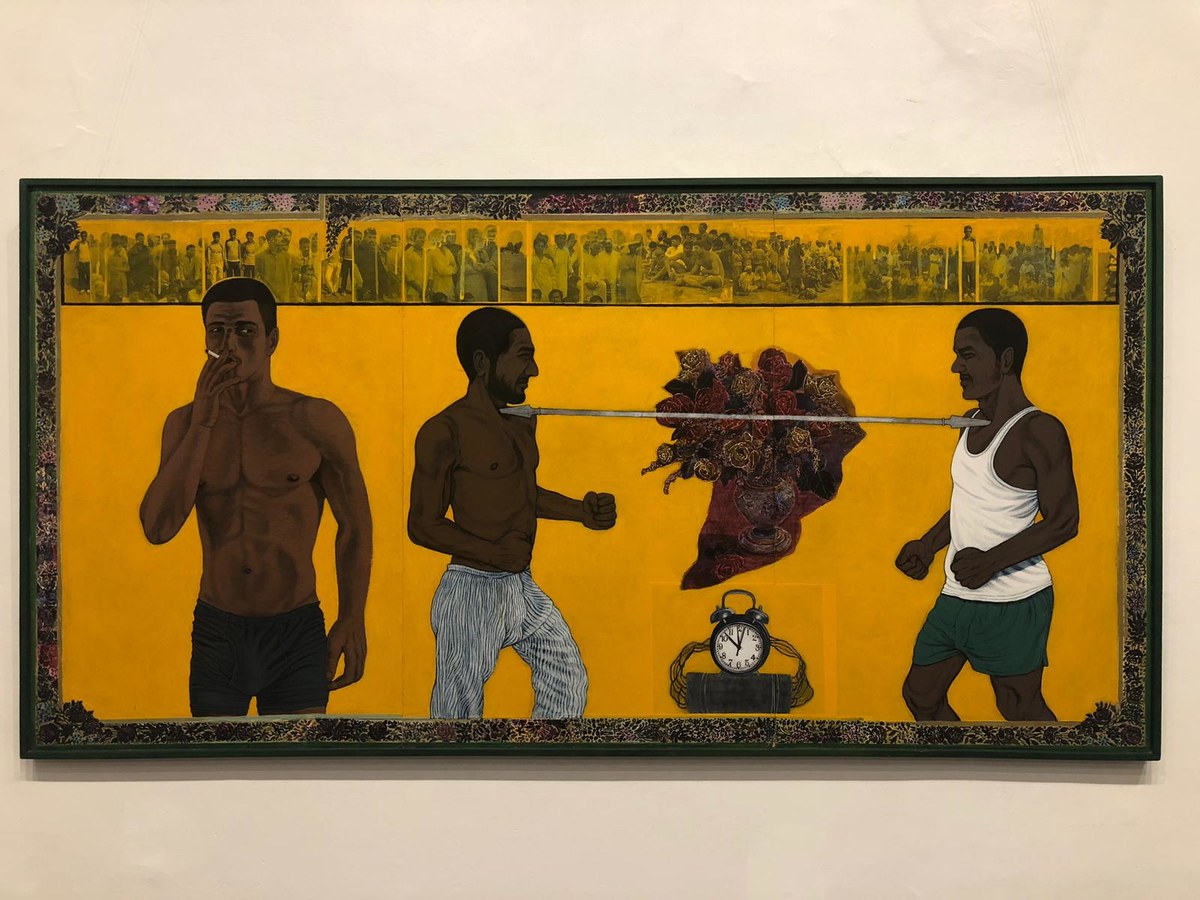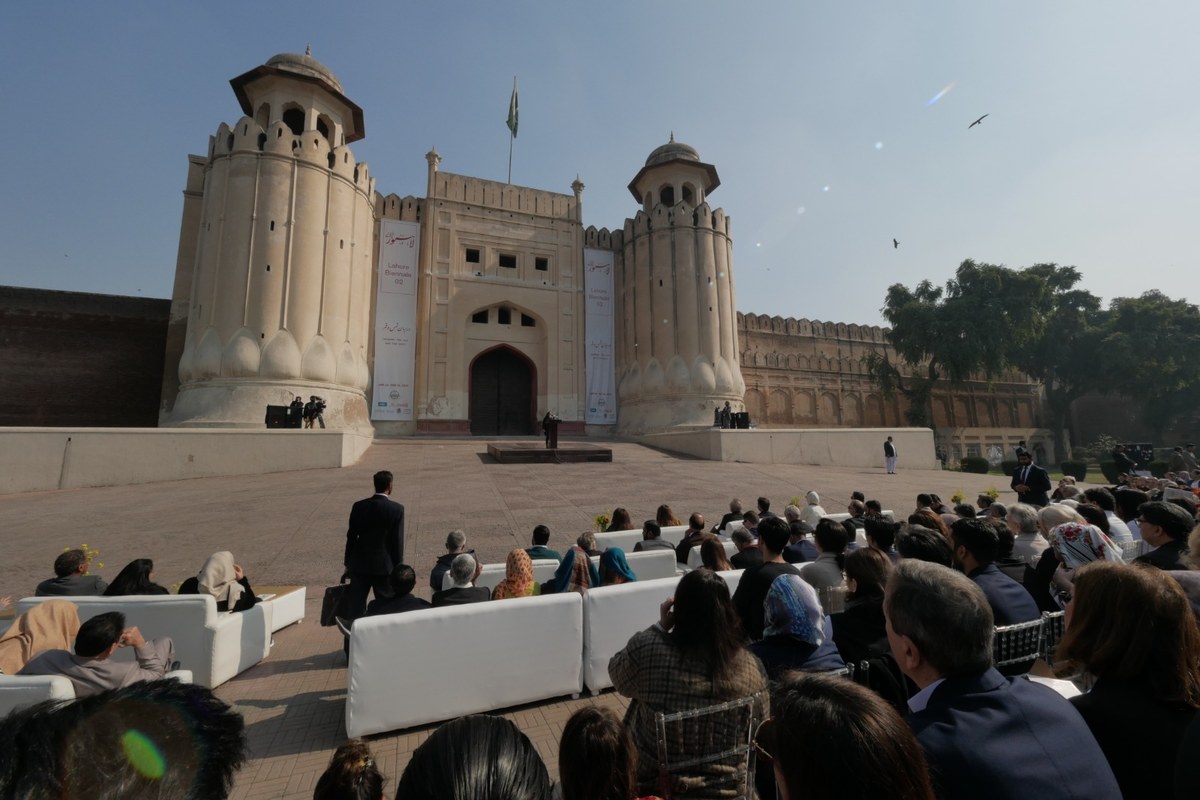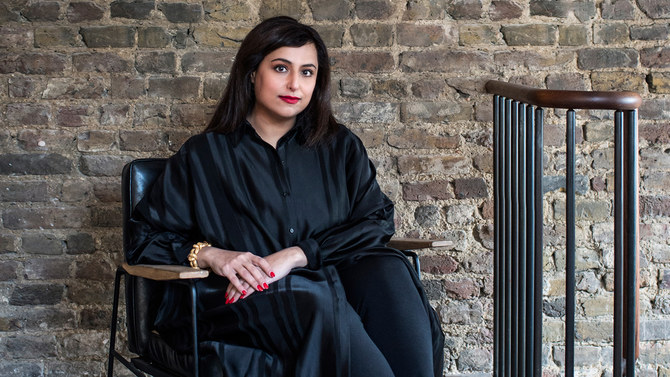LAHORE: “The world has to understand what the history of Lahore is,” curator Sheikha Hoor Al-Qasimi said, as she explained how the Lahore Biennale could illuminate the richness and culture of the region and simultaneously foster international dialogues.
Themed “Between the Sun and the Moon,” the 2020 Lahore Biennale is now on view at various venues around the eastern Pakistani city. It is the first time that such a significant number of contemporary artists from all over the world have flocked to Lahore to display their work at historical sites across the city.

Rasheed Araeen's Shamiyaana -Food for Thought: Thought for Change displayed at the National College of Arts in Lahore on Jan. 28, 2020. (AN photo by Aisha Zaman)
In 2018, the inaugural Lahore Biennale attracted 1.5 million visitors according to its organisers-- an extraordinary number for an exhibition that only ran for a fortnight.
But it was Sharjah’s renowned Sheikha Al-Qasimi, considered one of the foremost authorities in the contemporary art world, who proposed the second edition, which launched over the weekend and will run through the end of February.
At the inauguration ceremony on Sunday evening, set against the backdrop of the majestic Lahore Fort, the audience comprised not just a spectacular line-up of local and international artists and politicians, but also eminent Middle Eastern personalities ranging from members of the Sharjah royal family to cultural authoritative figures such as Noura Al Kaabi, UAE’s Minister of Culture and Knowledge Development-- all of them in attendance simply because of their trust in Al Qasimi’s vision.

Barbara Walker’s “Transcended,” a series of site specific charcoal wall drawings depicting soldiers from the Commonwealth in World War I at Lahore’s historic Tollinton Market on Jan. 28, 2020. (AN photo by Aisha Zaman)
“I have blind faith in her curatorial skills. I am here because I know she will deliver a spectacular show,” said Mia Eldib, Sotheby’s Middle East consultant on Contemporary Arab Art, on her first visit to Lahore.
Some of the most popular contemporary artists recognised in the West belong to Pakistan, such as Shazia Sikander, Imran Qureshi, Aisha Khalid and Huma Mulji to name a few.
But, Al Qasimi’s mission is quite the opposite.
“Art is not just for the art elites,’ she said and added that it was not enough to offer international recognition to brilliant artists from the region, but instead to also bring foreign artists to engage with local artists and the community; a herculean task, which could only be accomplished by someone of Al Qasimi’s stature.

Anwar Saeed’s “Habits of Being II (2011)” at the NCA, Lahore on Jan. 28, 2020. (AN photo Aisha Zaman)
Al Qasimi’s list of job titles, accolades, and collaborations is so long that it is hard to keep track of them all. The President and Director of the Sharjah Art Foundation, she is renowned for transforming Sharjah into an international art capital. She curated the UAE National Pavilion for the Venice Biennale in 2015 and is President of the International Bienniale Association. She also serves on the board of directors for the Museum of Modern Art PS1 in New York, Kunst-Werke in Berlin, Ashkal Alwan in Beirut and Sharjah Architecture Triennial as well as advisory boards for Khoj, New Delhi and Darat al Funun, Amman.
Her vision has led to the formation of the Sharjah Art foundation and other side projects, including the Africa Institute and the new Africa Hall. The Sharjah Biennale is consistently rated as one of the top 10 biennales in the world, which is quite the tribute when there are hundreds of art exhibitions taking place around the globe every year.
Yet, Al Qasimi said many artists were initially hesitant to travel to Pakistan, mindful of warnings that foreigners may be targeted and the threat of terrorist attacks. She managed to convince them otherwise. Now, works by around 80 artists, including 20 new commissions, will go on display in different venues across Lahore. British artist Barbara Walker will also be crafting a large wall mural in the city’s historic Tollington Market.

Inauguration of Lahore Biennale, Hazuri Bagh, Lahore Fort on Jan. 26, 2020. (Image Courtesy Lahore Biennale)
Lahore is new to the curator, which is one of the reasons she accepted the invitation to organise it from Qudsia Rahim, co-founder and director of the Lahore Biennale Foundation.
“I initially stated I will do it if I have the time, but I didn’t have the time, yet here I am,” Al Qasimi said with a mischievous smile.
“I was very interested because there is a long history between Pakistan and the UAE,” she said.
Over a series of speedy visits, she discovered Lahore--- a city with an abundance of historic sites, colonial-era markets as well as interesting modern buildings.
“Originally, I wanted the event to span the whole city, but then I had to cut it down due to practicality,” she said of selecting her venues.
The chosen sites include Lahore’s cricket ground, the Gaddafi Stadium, Lahore Fort and various other heritage sites. However, securing the city’s planetarium, which is run by Pakistan International Airlines, was her biggest achievement. It is a place many from the current generation have never heard of.

Installation by Khadim Ali at Summer Palace , Lahore Fort in Jan. 26, 2020. (Image Courtesy Lahore Biennale)
With Rahim’s help and countless negotiations, Al Qasimi persuaded the national carrier to open the planetarium’s doors to a new commission-- an immersive multimedia installation created by Berlin-based, Kazakhstan-born artist Almagul Menlibayeva, that was inspired by the astronomical discoveries made by Islamic astronomers in ancient Samarkand.
It will include site-specific performances by the Amsterdam-based sound artist German Popov and Russian artist Inna Artemova.
This work befits the title of the biennale: ‘Between the Sun and the Moon,’ although the exhibition’s main focus will be on earth, and in particular, on the ‘Global South,’ which is the curator’s longstanding area of interest.
Commenting on the theme, Al Qasimi said: “For centuries, inhabitants of these regions oriented themselves with reference to the sun, the moon and the constellations. How do we reflect on our place within the universe today, at this junction of climate crisis and polarities between societies?”
“I wanted to do something about identities and connecting cultures because of the diaspora of British Asians and South Asians in the Middle East,” she said.
Given the relative scarcity of regional dialogues within South Asia, the Biennale aims to foster a deeper and multifaceted exchange within Asia and the rest of the world; where physical boundaries are blurred to initiate conversations and to embark on a global mission to carve out a sustainable future.
At the same time, the city of Lahore becomes a wonderful catalyst for engaging local audiences with contemporary art and incorporating regional artists into the global art scene.
“It is time to celebrate the opening up of this rich country,” Al Qasimi said. “With its plethora of artists, institutions and cultural heritage.”












